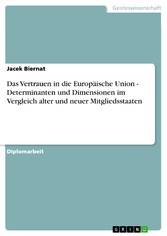Suchen und Finden
Das Vertrauen in die Europäische Union - Determinanten und Dimensionen im Vergleich alter und neuer Mitgliedsstaaten
Mehr zum Inhalt

Das Vertrauen in die Europäische Union - Determinanten und Dimensionen im Vergleich alter und neuer Mitgliedsstaaten
Diplomarbeit aus dem Jahr 2007 im Fachbereich Soziologie - Politik, Majoritäten, Minoritäten, Note: 1,6, Europa-Universität Viadrina Frankfurt (Oder) (Frankfurter Institut für Transformationsstudien (FIT)), Sprache: Deutsch, Abstract: Popular opinion of the European Union is becoming increasingly important for its legitimacy. This is due to the transfer of competencies from the member state to the European level, resulting in politicization. The purpose of this empirical study is to investigate citizens' trust in the EU as a political entity. According to the theory of political support originally developed by David Easton, trust is a central orientation toward a political system. While rather diffuse in nature, it simultaneously depends considerably on specific attitudes. As for the research design, the position of trust - diffuse or specific - will first be identified with the instrument of the principal components analysis using the 1999 wave of the European Values Survey and the Eurobarometer 62 (2004). Secondly, twelve hypotheses on possible determinants of attitudes toward integration will be tested in a series of standardized multiple regressions run separately on fourteen countries. As the results show, trust in the EU is not well internalized. In many countries, it is impossible to clearly attribute it to one of the factors of political support. However, in Western und Southern Europe the EU seems to be perceived as simply another regime institution, hence a part of the 'domestic' political system. In contrast, in Britain and Eastern Europe, a 'general European factor' emerges showing that respondents separate the national political system from the 'foreign' European sphere. Across Europe, the three necessary factors shaping trust in the EU are as follows: trust in national parliament, satisfaction with EU democracy, and trust in the social security system. Support of the nation state and satisfaction with its systemic performance boost the respondents' trust in the EU. Thus, the EU is not viewed as an alternative to the domestic regime because the later is ineffective. However, the citizens also base their support for the EU depending on their understanding of democracy. Ultimately, few variables other than their political attitudes determine citizens' trust in the EU. When all plausible economic and political explanations are accounted for, identity and let alone religion have but minor additional influence. The implication is that neither culture, identity, nor religion poses a long term threat to the consolidation of popular support, and the level of trust can be elevated if Europe and the member states deliver.
Alle Preise verstehen sich inklusive der gesetzlichen MwSt.










